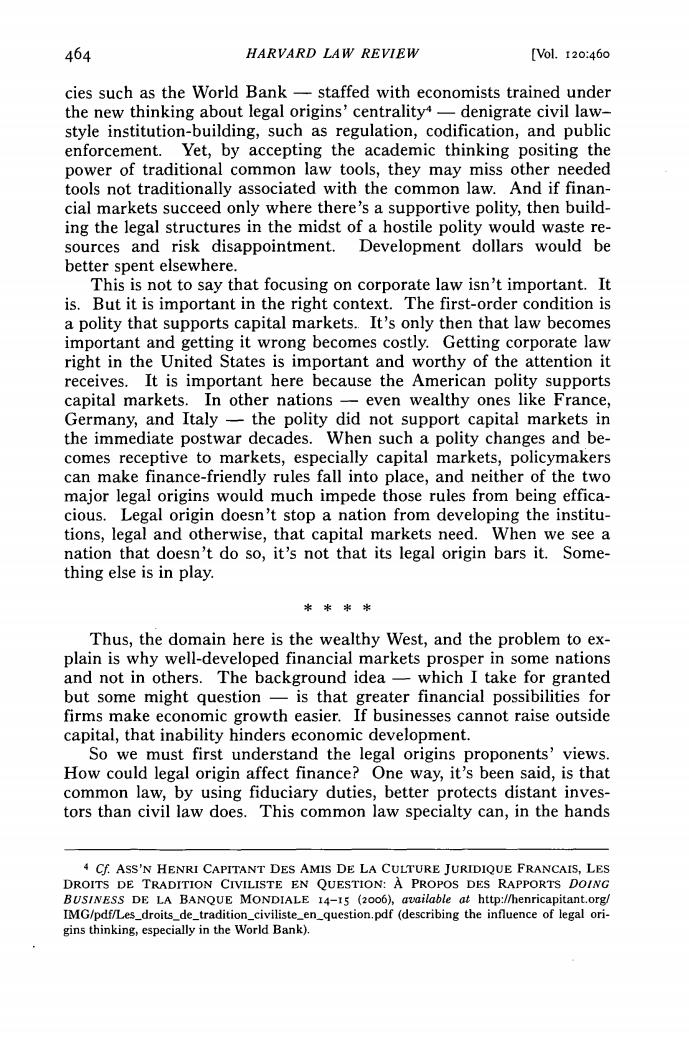正在加载图片...

464 HARVARD LAW REVIEW [Vol.120:460 cies such as the World Bank-staffed with economists trained under the new thinking about legal origins'centrality-denigrate civil law- style institution-building,such as ulation codification,and public enforcement Yet,by accepting the academic thinking positing th power of traditional common law tools,they may miss other needed tools not traditionally associated with the common law.And if finan- cial markets succeed only where there's a supportive polity,then build- ing the legal structures in the midst of a hostile polity would waste re- arces and risk disappointment Development dollars would be better spent elsewhere This is not to say that focusing on corporate law isn't important.It is.But it is important in the right context.The first-order condition is a polity that supports capital markets.It's only then that law becomes important and getting it wrong becomes costly.Getting corporate law right in the Un ted States important and worth of the attention receives. It is important here because the Ame ican polity supports capital markets.In other nations even wealthy ones like France, Germany,and Italy-the polity did not support capital markets in the immediate postwar decades.When such a polity changes and be. comes to markets,especially capital markets,po can make -frien dly rules fall into ace,and ithe of the two major legal origins s would much impede those rules from being effica- clous. Legal origin doesn't stop a nation from developing the institu- tions,legal and otherwise,that capital markets need.When we see a nation that doesn't do so,it's not that its legal origin bars it.Some- thing else is in play. 者米来浓 Thus,the domain here is the wealthy West,and the problem to ex- plain is why well-developed financial markets prosper in some nations and not in others.The background idea-which I take for granted but some might question is that greater financial possibilities for firms m ake growth easier If businesses c annot raise outside capital,that inability hinders economic development. So we must first understand the legal origins proponents' views How could legal origin affect finance?One way,it's been said,is that common law.by using fiduciary duties.better protects distant inves- tors than civil law does.This common law specialty can.in the hands ba http:/enricapitant.org IMG/pdf/Les_droits_de_tradition_civiliste lthe Worl Bao.p e thenHARVARD LAW REVIEW cies such as the World Bank - staffed with economists trained under the new thinking about legal origins' centrality4 - denigrate civil lawstyle institution-building, such as regulation, codification, and public enforcement. Yet, by accepting the academic thinking positing the power of traditional common law tools, they may miss other needed tools not traditionally associated with the common law. And if financial markets succeed only where there's a supportive polity, then building the legal structures in the midst of a hostile polity would waste resources and risk disappointment. Development dollars would be better spent elsewhere. This is not to say that focusing on corporate law isn't important. It is. But it is important in the right context. The first-order condition is a polity that supports capital markets. It's only then that law becomes important and getting it wrong becomes costly. Getting corporate law right in the United States is important and worthy of the attention it receives. It is important here because the American polity supports capital markets. In other nations - even wealthy ones like France, Germany, and Italy - the polity did not support capital markets in the immediate postwar decades. When such a polity changes and becomes receptive to markets, especially capital markets, policymakers can make finance-friendly rules fall into place, and neither of the two major legal origins would much impede those rules from being efficacious. Legal origin doesn't stop a nation from developing the institutions, legal and otherwise, that capital markets need. When we see a nation that doesn't do so, it's not that its legal origin bars it. Something else is in play. Thus, the domain here is the wealthy West, and the problem to explain is why well-developed financial markets prosper in some nations and not in others. The background idea - which I take for granted but some might question - is that greater financial possibilities for firms make economic growth easier. If businesses cannot raise outside capital, that inability hinders economic development. So we must first understand the legal origins proponents' views. How could legal origin affect finance? One way, it's been said, is that common law, by using fiduciary duties, better protects distant investors than civil law does. This common law specialty can, in the hands 4 Cf. AsS'N HENRI CAPITANT DES AMIS DE LA CULTURE JURIDIQUE FRANCAIS, LES DROITS DE TRADITION CIVILISTE EN QUESTION: APROPOS DES RAPPORTS DOING BUSINESS DE LA BANQUE MONDIALE 14-15 (2oo6), available at http://henricapitant.org/ IMG/pdf/Les-droitsdetradition-civiliste-en question.pdf (describing the influence of legal origins thinking, especially in the World Bank). [VOL. 120:46o